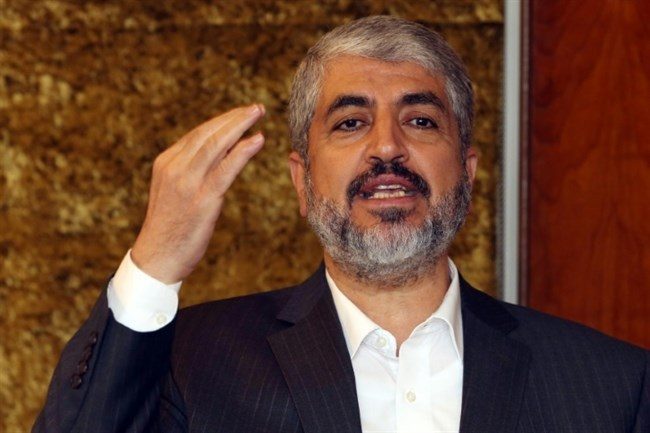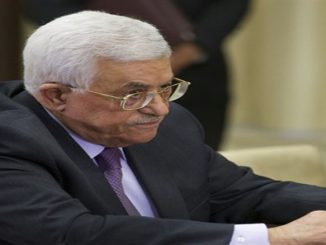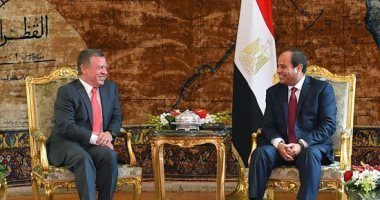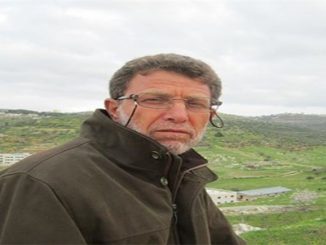
Hamas political chief Khaled Meshaal said he will not run for re-election as the head of the Palestinian group next year, Anadolu Agency reported.
“Khaled Meshaal will be the former head of Hamas’ political bureau next year,” he said during a speech in the Qatari capital Doha on Saturday.
Speaking during a televised panel discussion aired by Al-Jazeera Center for Studies, Mishaal confirmed reports that he will not run for reelection in the group’s upcoming internal voting, slated to take place in 2017.
“Next year Khaled Mishaal will be the former head of Hamas’s political bureau,” he said during a speech in Qatar. “We knocked at everybody’s door.
We believe that Palestine should be the nation’s cause. We are not part of regional divisions,” he stated. According to Mishaal, the Arab uprisings gave a sign of support to resistance movements and heralded a new phase in the group’s anti-occupation history. “The 2012 Israeli offensive is a clear example of pro-resistance back-up.
The war was short but its results were quite typical of the goals that can be scored by resistance groups should they be backed by Arab parties,” he explained.
Commenting on the Arab Spring, Mishaal stressed the mutual determinism between ongoing regional developments and Hamas’s anti-dictatorship activism.
“We run our political affairs with great precision and caution, according to an equation combining our interests and needs as a resistance movement on the one hand, and our ethics and principles on the other.
In case our interests and principles diverge, we certainly opt for the latter,” he insisted. Mishaal reiterated Hamas commitment to a policy of non-interference as regards states’ home affairs following the Arab Spring. “We tried hard to mitigate sectarian polarization.
Nonetheless, we are quite aware of the tragedy inflicted by sectarian indoctrination and foreign intervention,” he added. The Hamas leader warned of the “hazardous” repercussions of counter-revolutions insofar as they “turn political conflict into murder, nurture sectarian polarization, and suppress democracy.”
“The counter-revolution phase has been characterized by a tide of foreign interventions, the emergence of division schemes, and the return to normalization with Israel,” he noted.
He warned of underway attempts to turn the Palestinian cause into a bargaining chip and to strike at Hamas legitimacy by all means possible. “If Hamas has succeeded in managing the current phase it is because it shifted its center of attention to its own internal affairs,” noted Mishaal.
“Our arsenal is many times greater than it was in more tension-free phases.” The Hamas Chief denied rumors on the group’s obsession with political “chairs”, citing Ismail Haneyya’s resignation from the former Palestinian cabinet as a conclusive case in point.
“We welcomed municipal elections despite the fact that we’d not been involved in decision-making. As soon as we decided to run for the ballot, they suspended it,” he further stated. In a historic move of auto-critique and self-abnegation, Mishaal admitted that Islamic parties have certainly made mistakes.
“The real challenge facing Islamists in the Arab Spring countries is to cling to democracy no matter how excluded and unrecognized they have been. They have to remain greatly committed to partnership even if they are backed by a sweeping majority,” Mishaal clarified.
“Scientific experience has proved that the ballots are important but they are not enough to monopolize decision-making,” the Hamas Chief declared. Harking back to a meeting with a Fatah official in Damascus, Mishaal said: “I told him ‘we were certainly wrong when we thought that the Fatah era is over and that we are the substitute. But you were equally wrong when you ruled out Hamas role.’ ” “No party can run affairs on its own.
This is not an easy mission. The substitute theory is a wrong one. Partnership and consensus are the true path,” he stressed.
“We certainly made mistakes, but we scored several goals and provided typical models for resistance to the wars and the blockade,” he said. Mishaal cited two models; the first is that of the armed resistance, the second is of the popular resistance. “A child facing a tank” was among the instances he referred to as the best embodiment of the spirit of defiance and anti-occupation resistance inculcated by Hamas in the people.
“Hamas is a movement of national resistance and national liberation. Undoubtedly it has an Islamic background,” Mishaal underlined. “I believe that at this stage we should meticulously scrutinize our reality so as to develop ourselves intellectually, politically, and organizationally,” the Hamas leader emphasized.
“Yet, as much as I am keen on self-development, I am equally loathsome of submissiveness and derision of others,” Mishaal concluded. Mishaal, 60, has led the Hamas political bureau since 1996. He is a veteran politician with close ties to regional powers Qatar, Egypt and Turkey, among many others. Mishaal has lived for the past several years in Qatar.
His second eight-year term ended in 2013. At that time, Mishaal decided to retire, but was persuaded to remain in position by the movement’s decision-making council and also following popular back-up in the occupied Palestinian territories and the blockaded Gaza Strip.
Observers said though the Hamas Chief may not run for another term, his popularity has never faded away as time has passed by. His open-mindedness, charisma, and strength of character, which do clearly figure in his televised speech, have always made of him one of the world’s most renowned anti-occupation leaders.
Meshaal, 60, was elected the head of Hamas’ political bureau in 1996.
Originally based in Jordan, Meshaal relocated to Syria in 1999. He moved from the war-torn country in 2012, and has lived in Qatar for the past four years.
Media reports earlier said that Hamas deputy leader Ismail Haniyeh plans to vie for the presidency of Hamas political bureau in upcoming internal polls to succeed Meshaal.
“Hamas’ internal elections will be held next year and a new head of Hamas’ political bureau will be elected,” Meshaal said.
-Mistake
Meanwhile, Meshaal said that Hamas has made a mistake by ruling the Gaza Strip by itself.
“We were mistaken when we thought that the era of [Palestinian group] Fatah has gone and that Hamas time has come,” he said.
“Fatah has also made a mistake when it tried to marginalize us,” Meshaal said.
Hamas has seized control of the Gaza Strip in 2007 after deadly infighting between the two rival groups. Shortly after capturing the territory, Israel tightened a crippling siege on the Gaza Strip, badly affecting livelihood in the seaside enclave.
Asked about Hamas’ relationship with Iran, Meshaal said his group manages its relations with Tehran “within the framework of striking a balance between necessities and principles”.
Meshaal admitted that Hamas has lost much support “because it has sided with the peoples”.
“Hamas is a resistance group and needs every piece of weaponry. However, it still sides with its nation and does not abandon its position even if the group is denied weapons,” he said.
Hamas’ relations with Egypt and Syria have badly been affected following the Arab Spring revolutions – which swept the Arab region in 2011.
Meshaal described the Syria people as “hero”, who was “a victim of an unprecedented international collusion”.



